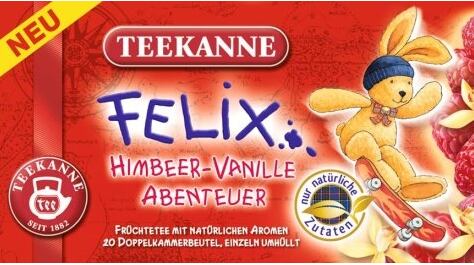The product in question, Felix Raspberry and Vanilla Adventure, contained the claim ‘fruit tea with natural flavourings’ and pictures of vanilla orchids and raspberries on the packaging – but neither of these natural ingredients were raspberry or vanilla.
Instead the natural ingredients were hibiscus, apple, sweet blackberry leaves, orange peel and rosehip. The ingredient list also said 'natural flavouring with a taste of vanilla’ and ‘natural flavouring with a taste of raspberry’.

The complainant told Dusseldorf’s regional court that a consumer could reasonably expect the tea to contain vanilla and raspberry or at least natural vanilla or raspberry flavouring. Teekanne has been ordered to stop marketing the product in its current form.
Game-changer
The ruling is somewhat of a game changer for food companies. Previous case-law of the Court of Justice had allowed food manufacturers to understand that they were not guilty of misleading consumers whenever correct and complete information was provided on the ingredients list, said lawyer at Food Compliance International, Sebastián Romero Melchor.
But a factual ingredients list no longer provided such protection.
“Now [with the Teekanne ruling] the Court has made clear that including a compliant ingredient list does not rule out per se the misleading character of a label whenever other elements such as pictures are included,” Melchor told FoodNavigator.
He believed the ruling would make manufacturers more wary of using expressions such ‘chocolate / vanilla flavour’ with pictures of fruit or other ingredients to depict the product’s flavour – but added that the implications of the ruling were further reaching and would apply to all aspects of the label.
Think creatively
But did this ruling mean that food manufacturers would be deprived of the ability to market their products effectively – that they would not be allowed to show a picture of a lemon if the lemon flavour was artificial?
Not necessarily, said Melchor. Any ruling would conduct an overall examination of the various claims (and suggested claims) on a product’s label and would make a decision on a case-by-case basis.
“A mere picture of a lemon, without other potentially misleading elements may not be considered misleading per se. For more certainty manufacturers could also emphasise in the label that the flavour is artificial.”
In a statement in German, food labelling expert from consumer rights organisation FoodWatch, Lena Blanken, said: “We need stricter rules for an understandable food labelling, as deception and consumer deception are unfortunately the rule at the supermarket, and not the exception."
FoodWatch calls for a comprehensive flavours declaration, realistic product images, clear nutritional and origin information and more information on the use of genetically modified ingredients.
Food regulatory expert for Food Compliance International, Lara Skoblikov, said that under EU law sanctions for such breaches took into account several factors – such as previous infringements – and so could vary from simple warnings to substantial fines.
